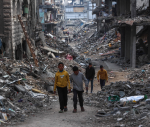You are here
Symbol of Iraqi divisiveness
May 31,2016 - Last updated at May 31,2016
The battle to liberate the Iraqi city of Fallujah is deepening the sectarian divide as reports confirm that Iranian General Qassem Suleimani is personally leading the notorious Popular Mobilisation Forces (PMF), which is predominantly Shiite.
The militia had in the past been accused of carrying out atrocities against Sunni residents of cities and towns that were held by Daesh.
Already there are reports that fleeing residents of Fallujah have been executed by members of the PMF militia.
The bitter irony is that more than 50,000 civilians in Fallujah are being punished by Daesh militants, who are using them as human shields, and the indiscriminate shelling of the Iraqi army, which destroyed schools, hospitals and houses in the beleaguered city.
The same took place in Ramadi few months ago. The city was levelled as the Iraqi army moved in to recapture it from Daesh.
The majority of residents have been displaced and there are reports that Sunnis from other towns have been prevented from returning to their homes.
If liberating Fallujah was meant to rescue the career of Prime Minister Haidar Al Abadi and end the political crisis in Baghdad’s Green Zone, the opposite is happening.
Iran’s brazen interference in Iraq’s affairs and its sectarian incitement is driving this war-torn country towards inevitable collapse.
Suleimani’s audacious presence in Fallujah is testimony to Abadi’s submission to Tehran. And as the dust settles in Fallujah, we will discover the reality of the incredible suffering by civilians there at the hands of both Daesh and the vindictive Shiite militias.
The fate of Fallujah is a harbinger of what could happen if and when the Iraqi government and its allies head to Mosul, a city of millions of people, mostly Sunnis.
It is a dismal choice for its residents: to stay under the yoke of Daesh or be killed or tortured by so-called liberators.
This is the state of Iraq’s absurd politics today. The country is falling apart as sectarian and ethnic bloodbaths tear it apart.
Daesh is a serious threat for Iraq, but it is not its only challenge. Even if the radical organisation is defeated and chased out, the future of Iraq looks bleak at best.
A victory over Daesh in the absence of genuine reconciliation between the country’s ethnic and sectarian components will be seen as a victory of one group over the other.
Iran’s agenda in Iraq is divisive and evil. It seeks to maintain hegemony over Iraq’s affairs while settling scores with its Sunni minority, including through sectarian cleansing
The political system that the US imposed in Iraq is dysfunctional and will not be able to repair the sectarian and ethnic chasms that have brought the country to its heels.
Iraq was already in trouble, even before the emergence of Daesh.
Eight years under Nouri Al Maliki’s rule deepened sectarian rifts and bankrupted the oil-rich country.
Iraq has one of the worst human rights records in the world and tops public corruption charts.
Confessionalism as system of government has enabled Iran to manipulate the political machinery of Iraq even as the US attempted to maintain its influence over the country.
The battle for Fallujah will be seen as another milestone in the slow disintegration of Iraq.
The Iranian involvement and the role of the PMF will deepen sectarian hatred and will further alienate the country’s Sunnis.
As a result, it will also paralyse the political machinery in Baghdad, which is already sabotaged.
Iraq’s partition looks more feasible with each passing day.
The central government is weak and it is being held hostage by Tehran.
Sunnis have lost trust in it and calls for carving out the country along sectarian and ethnic lines are getting stronger.
Iraqi Kurds have gone a long way in marking the borders of their own independent state and it is a matter of time before such state becomes a de facto reality.
It is unfortunate that Iraqi Shiite leaders are divided and helpless before Iranian designs.
Few secular figures have warned against Iranian interference, but in the heat of sectarian zeal their voices are not being heard.
Suleimani’s presence in Fallujah is an affront to every Iraqi nationalist. It is a clear testament to Iran’s direct and shameful interference in Iraqi affairs.
It is an insult to Abadi and the Iraqi army and a bold challenge to the Americans whose shortsighted policies have damaged this country beyond repair.
It is a long shot that Iraqi leaders will come together and make a last-ditch effort to save their country.
But one still hopes that somehow this will happen.
The alternative for the people of Iraq, and indeed the region as a whole, will be catastrophic.
The writer is a journalist and political commentator based in Amman.













